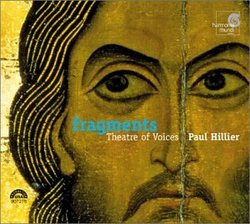Interesting concept, mostly enjoyable and very well recorded
LC | BC, Canada | 09/17/2002
(4 out of 5 stars)
"About the title: Paul Hillier's note for this recording informs us that "the title [Fragments] refers to the fragmented survival of the distant musical past in manuscript collections which are often in incomplete or damaged condition, and to the fragmentation of Christianity into Eastern Orthodoxy and Western Catholicism." And David Vernier, in his lengthier essay, stresses that "while the title of this recording aptly refers to the music we hear as 'fragments,' the term does not mean that you will hear compositions chopped off in mid-sentence, so to speak. Rather, these are self-contained and aesthetically satisfying pieces that fully demonstrate the music's style and substance."The pieces themselves are samples of chant and polyphony from Italy (1-5), Greece (6-9), Russia (10-13), England (14-20) and France (21). Hillier, director of the Theatre of Voices, writes that the program was conceived of as an "abstract design" highlighting "certain elements of feeling and sonority" which the different musical traditions represented here have in common. This is certainly an interesting idea, but I am not sure it entirely succeeds. It sometimes seems that at least some of the commonalities we hear are forced on the music, and so are more a feature of the performances than of the music itself. The Greek chant in particular barely sounds Greek at all after you've listened to a group such as the excellent Greek Byzantine Choir. Furthermore, I can't quite lose the feeling that I'm listening to a kind of "greatest hits" programme. That said, this recording could definitely serve as a very nice introduction to the world of chant and early polyphony for a newcomer, or as an enjoyable traversal of different styles for someone more familiar with them (even if perhaps they don't sound as different as they should).
The Theatre of Voices here consists of one countertenor, three tenors, and two baritones, including Hillier himself. The group has a very alluring sound, and the six men sound completely natural together. Questions of authenticity aside, the group sings each set of selections convincingly. The performances of Greek and Russian chant are enjoyable on their own terms, and it is particularly easy to lose oneself in the Italian and English selections. Perotin's polyphonic masterwork "Viderunt omnes," representing the French tradition, is well performed, though the music itself rather overshadows the other selections (which it actually antedates) in its sophistication. For Perotin, however, the competition is especially strong, and if one is considering this recording for "Viderunt Omnes," one would do better with the Hilliard Ensemble (also directed by Hillier), whose exquisite, liquid subtlety probably succeeds better than the Theatre of Voices' more driven performance.One certain reason to like "Fragments" is the excellent quality of the recording, which was made in the St. Osdag Church, Neustadt-Mandelsloh, Germany. I cannot think of any pure vocal recording I've heard with more natural and accurate balance and spatial definition, a feature which tends to make the group's cohesion all the more impressive."


 Track Listings (21) - Disc #1
Track Listings (21) - Disc #1